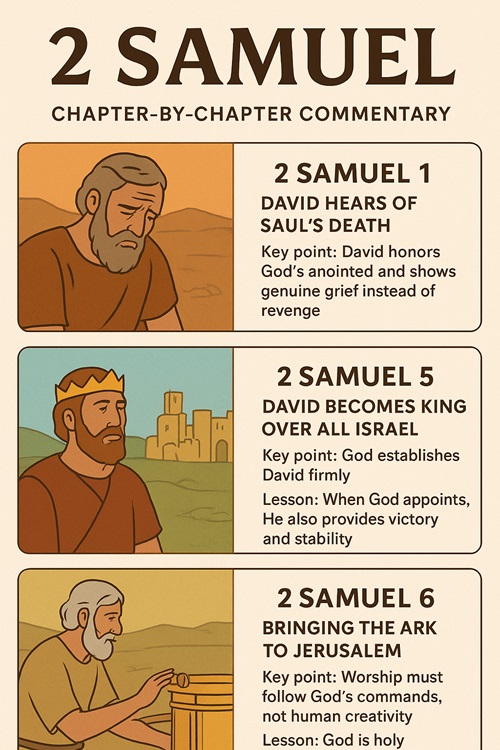God establishes David’s kingdom, demonstrates His covenant faithfulness, and shows that sin—especially among leaders—brings painful consequences, but genuine repentance brings mercy and restoration.
But this message unfolds through several deep, connected themes. Below is a detailed explanation.
📌 The Main Message of 2 Samuel (In Detail)
2 Samuel is not simply a historical record; it is a theological portrait of how God works with His people, His chosen king, and His covenant purposes.
1. God Establishes David as the Chosen King
One of the book’s central messages is that God Himself appoints leaders, and His choice is not based on human standards but on the heart.
-
David rises from being king of Judah to king over all Israel (2 Sam. 5).
-
God gives him victory over enemies.
-
Jerusalem becomes both the political and spiritual capital.
Message:
God’s purposes cannot be stopped by human opposition or politics. He raises the humble and resists the proud.
2. God Makes an Eternal Covenant with David (2 Samuel 7)
This is the theological heart of the book.
God promises David:
-
A house (dynasty)
-
A kingdom that will endure forever
-
A throne that will not be taken away
This covenant becomes the foundation for:
-
Israel’s royal lineage
-
Messianic hope
-
Jesus Christ, the Son of David
Message:
God is faithful across generations; His promises are everlasting and unbreakable.
3. Even God’s Chosen King Is Not Above God’s Law
David is a great king, but not a perfect man.
His sin with Bathsheba and Uriah (2 Samuel 11):
-
Breaks God’s commandments
-
Abuses power
-
Brings death and destruction to his family
God confronts David through the prophet Nathan (2 Samuel 12).
Message:
No one is too important to escape accountability. God’s leaders must live under God’s law.
4. Sin Has Real, Long-Term Consequences
David is forgiven—but the consequences of his actions unfold painfully:
-
The death of his infant son
-
Family violence
-
Amnon’s crime
-
Absalom’s rebellion
-
National instability
Students of Scripture often describe 2 Samuel as having two halves:
📌 Chapters 1–10: David’s Rise (Blessing)
📌 Chapters 11–24: David’s Decline (Consequences)
The turning point is David’s sin.
Message:
Forgiveness removes guilt, but it does not erase the earthly results of sin.
5. True Repentance Leads to Mercy and Restoration
David is not like Saul.
When confronted:
-
David confesses immediately
-
He takes responsibility
-
He seeks God’s mercy
Psalm 51 comes from this event—one of the greatest prayers of repentance.
Message:
God honors a repentant heart. Restoration begins with humility and confession.
6. God Works Through Imperfect People to Achieve His Perfect Plan
David is:
-
Courageous
-
Faithful
-
Worshipful
-
But also deeply flawed
Still, God uses him to advance His kingdom.
Message:
God’s grace surpasses human weakness. His purposes are not defeated by human failure.
7. God Is Sovereign Over Nations and History
Throughout the book:
-
Nations rise and fall
-
Rebellions occur
-
Battles are fought
-
Leaders plot and fail
But above all this, God’s hand is directing history toward His covenant plan.
Message:
History is not random—God is always in control, guiding events toward His promises.
8. God Desires Obedience, Worship, and Justice
David’s best moments come when he:
-
Honors God’s holiness (Ark of the Covenant)
-
Shows covenant kindness (Mephibosheth)
-
Leads with justice and righteousness
His failures come when he:
-
Neglects his duty
-
Acts selfishly
-
Misuses royal authority
Message:
God values leaders who serve with humility, justice, and devotion.
💡 In Summary: The Main Message of 2 Samuel
-
God’s kingdom is built on His promises, not human strength.
-
God exalts the humble and brings down the proud.
-
God’s covenant stands firm even when His people fail.
-
God forgives truly repentant hearts.
-
Sin carries painful consequences, especially for leaders.
-
Through the line of David, God prepares the way for the Messiah.
